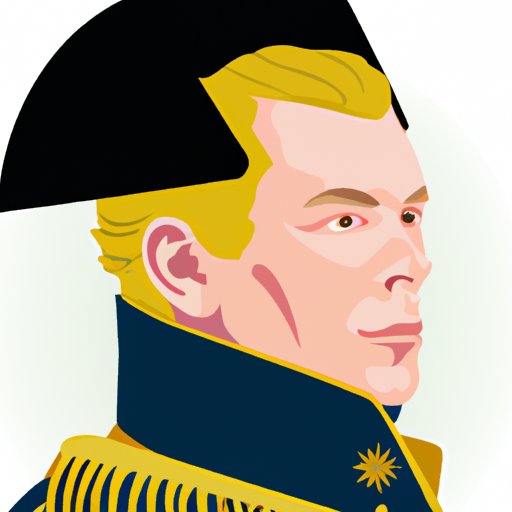Introduction
Leadership is an elusive quality, yet throughout history there have been individuals who have demonstrated exceptional talent in this area. One such person is Napoleon Bonaparte, the French military and political leader who rose to power during the late 18th and early 19th centuries. In this article, we will explore what made Napoleon a great leader, analyzing his military and political strategies, diplomatic skills, ability to inspire his followers, ability to adapt to changing circumstances, impact on European laws, and lasting legacy.
Analyzing Napoleon’s Military Strategies
Napoleon was a masterful strategist and tactician, renowned for his innovative approach to warfare. He was able to outsmart his opponents by using tactics such as flanking maneuvers, feints, and surprise attacks. His use of artillery was particularly effective, allowing him to quickly gain the upper hand in battle. These strategies enabled Napoleon to win many of the wars he fought and expand the French empire.
Napoleon also had a keen understanding of logistics and supply chains. He was able to move his troops efficiently across vast distances and ensure they had the resources they needed to fight effectively. This attention to detail was a crucial factor in his success.
Examining Napoleon’s Political Acumen
Napoleon was a shrewd politician and diplomat, able to forge alliances with powerful figures in Europe and beyond. He used these connections to further his ambitions, and was often able to outmaneuver his opponents through clever negotiation and manipulation. He was also adept at public relations, ensuring that his reputation remained high even in the face of adversity.
Napoleon was also a skilled negotiator, able to make concessions when necessary while still achieving his goals. This allowed him to reach agreements that were beneficial to both sides, something that few other leaders could manage.
Exploring Napoleon’s Ability to Inspire His Followers
Napoleon had an innate ability to motivate and inspire those around him. He was a charismatic leader who was able to rally his troops to fight for a cause greater than themselves. He also had a knack for manipulating public opinion, using propaganda and rhetoric to sway popular sentiment in his favor.
Napoleon was also a master of psychological warfare, able to unsettle his enemies without resorting to violence. He understood how to exploit psychological weaknesses and turn them to his advantage.
Evaluating Napoleon’s Ability to Adapt to Changing Circumstances
Napoleon was not afraid to take risks, often making bold decisions that paid off in the end. He was willing to adjust his plans when needed, adapting to changing circumstances and taking advantage of new opportunities. This enabled him to stay one step ahead of his opponents and remain in control of the situation.
Napoleon also recognized the importance of flexibility. He was able to adjust his tactics to fit the situation, whether it was a large-scale battle or a small skirmish. This ability to think on his feet was a major factor in his success.
Investigating the Impact of Napoleon’s Laws on Europe
Napoleon was a prolific reformer, introducing sweeping changes to European law, government and society. He sought to create a unified system of laws that could be applied across the continent, and his reforms laid the foundation for the Code Napoléon, which would become the basis for much of modern European law.
Napoleon also sought to improve the lives of his citizens, introducing progressive reforms that improved education, healthcare, and infrastructure. These reforms helped to create a more equitable society, and their effects can still be felt today.
Assessing How Napoleon Changed the Face of Warfare
Napoleon revolutionized warfare, introducing new weapons and tactics that would shape the way battles were fought for centuries to come. He was the first to introduce mass conscription, and his use of artillery and cavalry changed the face of warfare forever.
He also developed modern military strategy, using tactics such as divide and conquer and guerrilla warfare to great effect. Many of these strategies are still used today, a testament to Napoleon’s genius.
Investigating Napoleon’s Legacy and Influence on Modern Leadership
Napoleon’s legacy lives on, and his influence can still be seen in the world of modern leadership. His strategic thinking, political acumen, and ability to motivate people are all traits that contemporary leaders strive to emulate.
His place in history is secure, as one of the greatest leaders of all time. His example serves as an inspiration to future generations, demonstrating that ambition and determination can be used to achieve greatness.
Conclusion
Napoleon Bonaparte was a remarkable leader who left an indelible mark on history. His military and political strategies, diplomatic skills, ability to inspire his followers, and willingness to adapt to changing circumstances enabled him to achieve greatness. He introduced sweeping reforms to European law, government and society, and his innovations in warfare shaped the way battles were fought for centuries afterwards.
Napoleon’s legacy lives on, and modern leaders can learn from his example. His accomplishments serve as a reminder that ambition, determination, and the ability to think strategically are essential qualities for any leader.
(Note: Is this article not meeting your expectations? Do you have knowledge or insights to share? Unlock new opportunities and expand your reach by joining our authors team. Click Registration to join us and share your expertise with our readers.)
